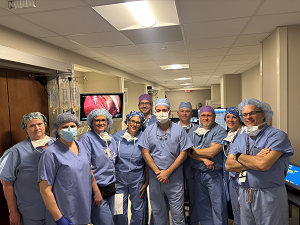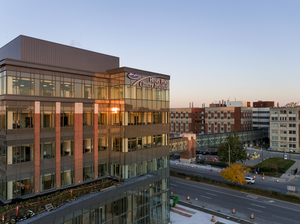Relaxing Meditation
While the use of meditation and breathing exercises are not an alternative treatment or cure for cancer, they have been shown to help people with...
Appendix cancer, also known as appendiceal cancer, affects fewer than 1,000 people in the United States each year. While rare, several effective treatment options are available. Our expert team of cancer specialists will create a personalized treatment plan tailored to your needs.
Our Henry Ford Cancer team includes cancer specialists from medical oncology, radiation oncology, and surgical oncology, who meet regularly to review your case. We will be with you every step of the way – from diagnosis and treatment, through recovery.
Our patients have access to the top fellowship-trained surgeons and the most advanced science-based technologies and treatments for the various types of tumors that can start in the appendix:
Surgery is the most common treatment for appendix cancer. Our team uses the most advanced techniques whenever possible, to offer you the best outcome.
Depending on the disease type, your treatment plan may also include the administration of chemotherapy and/or radiation therapy, either before or after surgery.
Your multidisciplinary team at Henry Ford Cancer will provide you with the answers, support, and resources at every step of your cancer treatment and recovery and includes:
While the use of meditation and breathing exercises are not an alternative treatment or cure for cancer, they have been shown to help people with...
Henry Ford Cancer is excited to partner with Detroit health organization The Village Personal Training and Wellness to bring you Sound Bath and...
This support group is hosted every other month for patients with Neurofibromatosis types 1 and 2 and their care partners. Medical experts will...
This twice monthly group, facilitated by a professional counselor/social worker, offers patients an opportunity to express their feelings and...





Cancer can be a tricky subject to navigate. If a friend or family member is diagnosed, here's some advice on what to say and what not to say.

Asking for help isn’t always easy, but if you have cancer, delegating tasks can make you and your support network feel better. Here’s how.

Think alcohol in moderation isn't so bad? Turns out, that's not quite true. Even less than one drink per day can increase the risk of certain cancers. Learn more.

Being a caregiver for a loved one going through cancer treatment isn't easy. It's important to take time for self-care so you can avoid burnout.
We use cookies to improve your website experience. By using this site, you agree to our Terms of Use. Read our Internet Privacy Statement to learn what information we collect and how we use it.